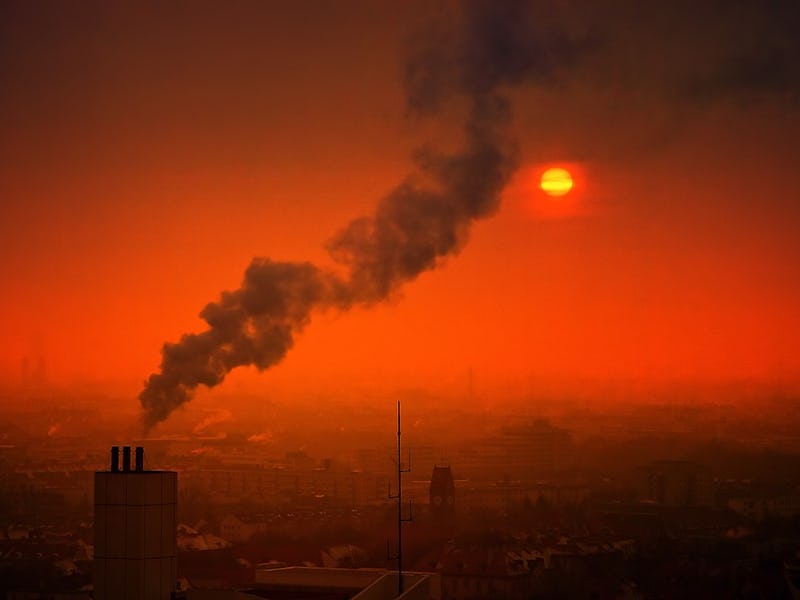Air Pollution Is Linked to Unhappiness in Study of 144 Chinese Cities
"Pollution also has an emotional cost."

There are only a few places in the world with a worse record of air pollution than large cities in China, where the occasional deep blanket of rolling smog force people indoors.
The authors of a study released Monday in the journal Nature Human Behaviour believe that the dramatic nature of the smog that pervades some Chinese cities may contain an important lesson for us all: Air pollution is making people in China unhappy.
As the faculty director of the MIT China Future City Lab and a former Beijing resident who remembers the smog days vividly, Siqi Zheng, Ph.D., believes that air quality takes a serious toll on the happiness of Chinese city dwellers.
“Pollution also has an emotional cost,” Zheng says in a statement released with the research. “People are unhappy, and that means they may make irrational decisions.”
Zheng’s paper looked at 210 million updates to Sina Weibo, a Chinese social media platform that’s very similar to Twitter, from residents in 144 Chinese cities to quantify how much air quality might impact mood. When she compared the overall sentiment of those updates — she determined mood using an AI algorithm — she found a strong negative correlation. The worse the air quality was outside, the moodier people’s tweets became.
Beijing on a particularly smoggy day.
“We thought okay, we’re in this new era of big data. With this language-processing algorithm we can calculate this sentiment index in this huge dataset,” Zheng tells Inverse. “Basically, that’s a real-time measure of the sentiment of many many cities, [and] lots of people. On average, there’s a very significant negative correlation between mood and pollution.”
Zheng says that there are some important drawbacks to her type of broad analysis. For example, one can’t factor in context clues, like income or hometown, from the updates. Zheng’s research shows correlation, not causation. She also collected her data between March and November in 2014.
Zheng also removed tweets that dealt directly with air quality, creating a dataset that reflects a succinct, and hopefully, she adds, honest, snapshot of how someone was feeling on at one particular moment. Taken together, her data creates a general picture of how air pollution influences daily life and happiness.
The sentiment analysis algorithm scored tweets on a happiness scale of zero (very negative) to 100 (very positive). The worse the air pollution was outside, the more the sentiment scores dropped.
It turns out that being stuck inside because the air is unbreathable can really throw a wrench into one’s weekend plans. For example, Zheng noticed that even if the air pollution levels were the same between weekdays and weekends, people seemed to react more negatively to air pollution on their days off — that trend held even when she controlled for extra social media use (you’re probably more likely to fire off an angry tweet if you’re trapped inside).
"Although they can still get food and services, they actually lose this opportunity to go out. To interact with their friends and business people."
“Our explanation is that for weekends and holidays, people always have their plans to go outside for leisure activities and have reunions with their friends. If it’s polluted then they have to cancel,” she says.
It’s not surprising that people don’t enjoy having their plans canceled because air pollution is so bad. Zheng believes that as air pollution becomes worse over time, people are going to experience social costs that have effects on happiness more often.
“When the air is polluted people stay home, they don’t go out, and they order food delivery while staying home playing computer games and shopping online,” she says. “Although they can still get food and services, they actually lose this opportunity to go out. To interact with their friends and business people.”
These costs will be borne by the “silent majority.” Although fortunately for her study, the residents of China’s cities weren’t exactly silent. At least by her calculations, their social media updates spoke volumes.
Abstract
High levels of air pollution in China may contribute to the urban population’s reported low level of happiness1,2,3. To test this claim, we have constructed a daily city-level expressed happiness metric based on the sentiment in the contents of 210 million geotagged tweets on the Chinese largest microblog platform Sina Weibo4,5,6, and studied its dynamics relative to daily local air quality index and PM2.5 concentrations (fine particulate matter with diameters equal or smaller than 2.5 μm, the most prominent air pollutant in Chinese cities). Using daily data for 144 Chinese cities in 2014, we document that, on average, a one standard deviation increase in the PM2.5 concentration (or Air Quality Index) is associated with a 0.043 (or 0.046) standard deviation decrease in the happiness index. People suffer more on weekends, holidays and days with extreme weather conditions. The expressed happiness of women and the residents of both the cleanest and dirtiest cities are more sensitive to air pollution. Social media data provides real-time feedback for China’s government about rising quality of life concerns.
Now watch this: NASA Video Shows How Air Pollution Is Changing Worldwide